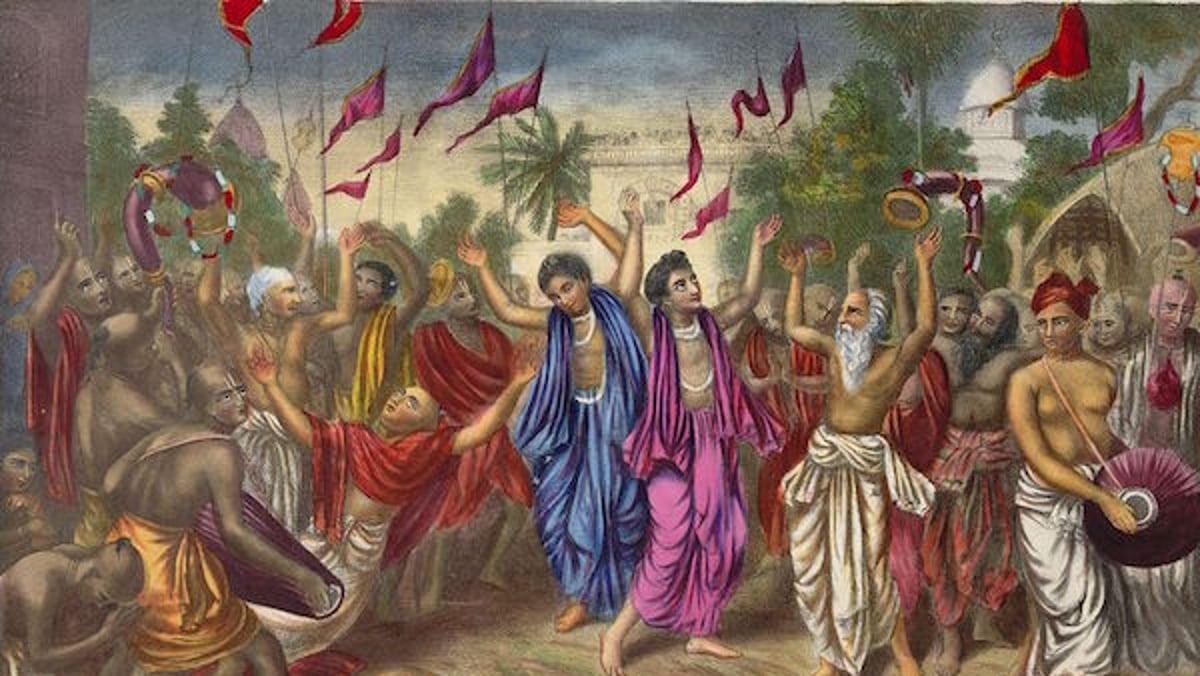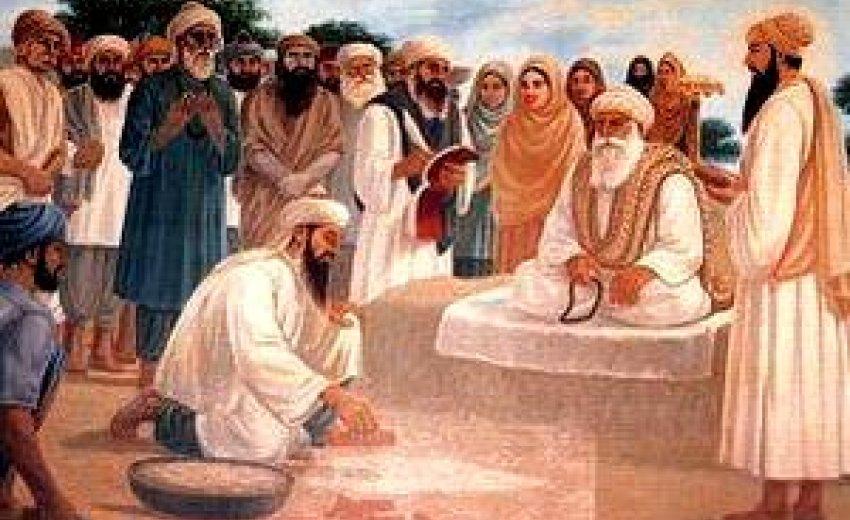Table of Contents
The Bhakti and Sufi Movements are important for UPSC exam preparation as they form an essential part of Indian history and culture. These movements, emerging in the 8th century AD, highlight personal devotion and religious tolerance. The Bhakti Movement focused on devotion to a personal god and challenged the caste system, while the Sufi Movement focused on mystical practices and inner purification.
Understanding these movements helps candidates grasp India’s diverse cultural heritage is vital for General Studies, history, and sociology topics. This knowledge also enhances essays and ethics discussions, making it an important part of study for the UPSC examination.
Bhakti Movement and Sufi Movement
Bhakti and Sufi movements were two significant religious movements that emerged in medieval India. Bhakti is a term used in Hinduism that means devotion or love towards a personal God. On the other hand, Sufism is a mystical tradition in Islam that emphasizes the inward search for God and the union of the individual self with the divine.
Origin of the Bhakti Movement
The Bhakti movement began in southern India during the seventh century and spread to the north by the twelfth century. The movement emphasized the devotional aspect of Hinduism and rejected the caste system. Bhakti saints such as Kabir, Ravidas, and Nanak emphasized that devotion to God is more important than external rituals and that anyone, regardless of caste, can achieve salvation. They also stressed the unity of God and that there is no difference between Hinduism and Islam.
Origin of the Sufi Movement
The Sufi movement emerged in India during the eighth century and peaked in the eleventh and twelfth centuries. The movement emphasized the importance of a personal relationship with God and that the ultimate goal of human life is to achieve spiritual union with the divine. Sufi saints such as Moinuddin Chishti, Nizamuddin Auliya, and Amir Khusro stressed the importance of love and compassion and rejected religious formalism.
Importance of the Bhakti Movement
The Bhakti Movement is one of the most significant cultural movements in the history of India. The movement began around the 8th century AD and continued until the 17th century. Bhakti is a Sanskrit word that means devotion or love for the Divine. The Bhakti Movement emphasized the idea of personal devotion to God, as opposed to the traditional Vedic rituals and sacrifices.
- The Bhakti Movement originated in South India and spread throughout the Indian subcontinent. It was a movement that sought to bring people closer to God by emphasizing the importance of personal devotion and spiritual experience.
- The Bhakti saints taught that God is accessible to all, regardless of caste, creed, or gender, and that one could attain liberation from the cycle of birth and death through devotion and love for the Divine.
- The Bhakti Movement responded to the rigid caste system and the dominance of Brahminical rituals in Hinduism.
- The movement rejected the idea of caste and emphasized that anyone, regardless of birth, could attain salvation through devotion to God.
- The Bhakti saints also rejected the authority of the Brahminical priesthood and emphasized the direct relationship between the individual and God.
- The Bhakti saints composed devotional poetry and songs in the local vernacular languages, such as Tamil, Telugu, Marathi, and Hindi.
- They used simple language and imagery from everyday life to convey complex spiritual concepts to the masses.
- The devotional literature of the Bhakti Movement played a crucial role in the spread of the movement and the democratization of religious knowledge.
- The Bhakti saints emphasized the importance of social reform and criticized the prevalent social evils such as untouchability, child marriage, and dowry. They advocated for social equality, education, and women’s rights.
- The Bhakti Movement also had a significant impact on the arts, literature, and music of India. The devotional songs and poetry of the Bhakti saints inspired classical Indian music, dance, and theatre.
- The Bhakti Movement had a profound impact on the religious and social landscape of India. It challenged the authority of the Brahminical priesthood and promoted the idea of individual devotion to God.
- The movement also helped to bridge the gap between the upper and lower castes and contributed to the development of vernacular literature and music.
- The Bhakti Movement continues to be a significant influence on modern Indian spirituality and culture.
The Bhakti Movement was a significant cultural movement that focused on personal devotion to God, social equality, and spiritual experience. It challenged the traditional rituals and caste system of Hinduism and contributed to the development of vernacular literature and music. The Bhakti Movement remains an important part of Indian spiritual and cultural heritage, and its impact continues to be felt to this day.

Importance of the Sufi Movement
The Sufi movement is a mystical and spiritual tradition that originated in the Islamic world and has gained followers across the country. The Sufi Movement focuses on finding a special connection with God through practising meditation, prayer, and thinking deeply. People who follow Sufism are called Sufis, and they want to feel even closer to God.
- Origins of Sufism: Traced back to early Islam in the 7th century as a response to the growing pursuit of wealth and focus on earthly matters.
- Early Sufis: Mystics search for a deeper understanding of the divine through inner spiritual practices, highlighting the direct personal experience of God over religious rituals and dogma.
- Core Teachings: Focus on love, compassion, and humility. The path to spiritual enlightenment lies in developing deep love and devotion for God and serving others with compassion and humility.
- Spiritual Goal: True spiritual practice aims to become a humble servant of God and a source of love and compassion for others, not personal enlightenment.
- Dhikr: Central practice involving repetitive chanting of God’s name or sacred phrases, believed to enhance spiritual awareness and connection with God.
- Meditation and Contemplation: Prioritise for quieting the mind and experiencing the divine presence within.
- Cultural Influence: Profound impact on Islamic culture and spirituality, inspiring celebrated poets, artists, and musicians.
- Spread of Islam: Instrumental in spreading Islam to non-Muslims, attracting many with its message of love and compassion.
Today, the Sufi movement has followers worldwide and is practised in a wide variety of forms. Some Sufis belong to formal orders, or tariqas, which have specific practices and teachings. Others practice independently, drawing inspiration from the teachings and practices of various Sufi teachers and traditions. Regardless of the form it takes, the Sufi movement continues to inspire people to seek a deeper connection with the divine and to live a life of love and compassion.

Bhakti Movement and Sufi Movement- Similarities
Despite the differences in their religious practices, both the Bhakti and Sufi movements emphasized the importance of personal devotion to God and the rejection of religious formalism. Both movements also played a significant role in promoting religious tolerance and harmony in medieval India. The Bhakti movement, in particular, emphasized the unity of all religions and the need to transcend caste and creed.
| Aspect | Bhakti Movement | Sufi Movement | Common Impact |
| Cultural Contributions | An essential part of Indian cultural heritage through Bhakti poetry and music | Significant contribution to Indian classical music | Enhanced Indian cultural and artistic heritage |
| Literature | Influenced the growth of vernacular literature | Also influenced the growth of vernacular literature | Promoted the development of regional languages and literature |
| Origins | Emerged in the medieval period within the Hindu tradition | Emerged in the medieval period within the Islamic tradition | Both originated in different religious traditions |
| Core Principles | Emphasis on personal devotion to God, rejection of religious formalism | Emphasis on personal devotion to God, rejection of religious formalism | Shared common emphasis on personal devotion and rejection of formalism |
| Religious Tolerance | Played a vital role in promoting religious tolerance and harmony | Played a vital role in promoting religious tolerance and harmony | Fostered an environment of religious tolerance and harmony |
| Impact on Society | Profound impact on Indian culture and society | Profound impact on Indian culture and society | Contributed significantly to the socio-cultural fabric of India |
Difference between Bhakti Movement and Sufi Movement
The Sufi Movement and the Bhakti Movement are two prominent spiritual movements that emerged in different parts of the world, with different origins and influences. While both these movements focus on the spiritual aspect of religion and emphasize the importance of personal experience, they differ in their teachings and practices.
| Aspect | Sufi Movement |
Bhakti Movement
|
| Origin | Emerged in the 8th century AD within Islam |
Emerged in the 8th century AD within Hinduism
|
| Etymology | The word ‘Sufi’ comes from the Arabic ‘suf’, meaning wool (early Sufis wore simple woollen garments) |
The term ‘Bhakti’ means devotion in Sanskrit
|
| Core Focus | Personal experience of God through meditation, contemplation, and inner purification |
Devotion (bhakti) to a personal god or goddess
|
| Ultimate Goal | Achieve union with God through deep love and devotion |
Attain salvation through devotion to God
|
| Approach to Caste System | Not specifically focused on caste |
Challenged the rigid caste system of Hinduism
|
| Path to Salvation | Inner purification, meditation, and contemplation |
Love and devotion to God, singing hymns, and chants
|
| Personal Experience | Emphasized as crucial |
Emphasized as crucial
|
| Practices | Meditation, contemplation, inner purification |
Devotion, singing hymns, and chants
|
| Influence on Other Religions | Primarily within Islam |
Influenced Sikhism, Buddhism, and other religions
|
The Sufi Movement and Bhakti Movement are two spiritual movements that emerged in different parts of the world and emphasized the importance of personal experience and devotion to the divine. While the Sufi movement focused on inner purification and contemplation, the Bhakti movement emphasized devotion to god and the importance of singing hymns and chants. Despite their differences, both movements have had a significant impact on their respective religions and continue to influence people’s spiritual lives even today.
Conclusion
The Bhakti and Sufi movements were important spiritual and social movements in medieval India.
The Bhakti Movement emphasized personal devotion to a single god, rejecting rituals and caste distinctions. Saints like Kabir and Mirabai taught that everyone is equal in the eyes of God, promoting love and devotion.
The Sufi Movement, part of Islamic mysticism, also focused on love, compassion, and unity. Sufi saints like Khwaja Moinuddin Chishti preached tolerance and simplicity, attracting people from different religions and backgrounds.
Both movements helped break down social barriers and promoted religious harmony. They taught values of love, devotion, and equality, which still influence Indian society today.



 TSPSC Group 1 Question Paper 2024, Downl...
TSPSC Group 1 Question Paper 2024, Downl...
 TSPSC Group 1 Answer key 2024 Out, Downl...
TSPSC Group 1 Answer key 2024 Out, Downl...
 UPSC Prelims 2024 Question Paper, Downlo...
UPSC Prelims 2024 Question Paper, Downlo...




